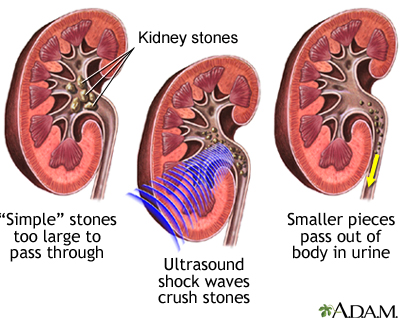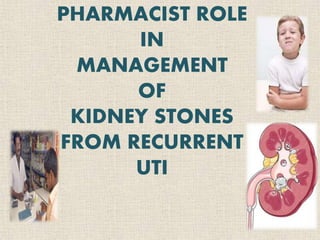Kidney Stones vs UTI: Recognizing the Overlapping Manifestations and Therapy Methods
Kidney Stones vs UTI: Recognizing the Overlapping Manifestations and Therapy Methods
Blog Article
Exploring the Symptoms and Causes of Kidney Stones in Comparison to Urinary System System Infections: A Detailed Overview
The expedition of kidney stones and urinary system system infections (UTIs) discloses an intricate interaction of signs and underlying causes that necessitate mindful exam. What are the key distinctions in their signs, and just how might these inform treatment approaches?
Review of Kidney Stones
Kidney rocks, additionally known as renal calculi, form when particular materials in the urine crystallize and accumulation, causing the advancement of difficult deposits within the kidneys. These rocks can vary in dimension, ranging from a grain of sand to a golf ball, and can be made up of various materials, the most usual being calcium oxalate, uric acid, struvite, and cystine. The formation of kidney stones is affected by several variables, including dietary routines, fluid intake, and hereditary predisposition.
Symptoms of kidney stones might consist of serious pain in the back or side, blood in the pee, nausea or vomiting, and regular peeing, particularly as the stone moves via the urinary system system. Medical diagnosis typically involves imaging research studies such as ultrasound or CT scans, together with urinalysis to identify the rock's composition.
Therapy choices vary based on the dimension and sort of rock, as well as the extent of signs (Kidney Stones vs UTI). Small rocks might pass normally with raised fluid intake, while bigger stones might need clinical interventions such as lithotripsy or medical removal. Comprehending the pathophysiology and threat variables linked with kidney rocks is necessary for effective avoidance and administration
Summary of Urinary System Infections
Urinary tract infections (UTIs) are typical microbial infections that affect any kind of component of the urinary system, including the kidneys, ureters, bladder, and urethra. They predominantly occur when germs, usually from the gastrointestinal tract, enter the urinary system, leading to swelling and infection.
The occurrence of UTIs is notably higher in women than males, mostly as a result of physiological differences, such as a much shorter urethra. Threat variables include sex, particular contraceptive methods, urinary system retention, and dehydration. The medical diagnosis of UTIs is normally confirmed with urine examinations, which may disclose the existence of microorganisms, white blood cells, or red blood cells.

Signs And Symptoms of Kidney Stones
The pain related to kidney rocks can show up in different means, commonly leading individuals to seek medical interest. One of one of the most common symptoms is extreme pain, normally local in the reduced back or side, which may radiate to the abdomen or groin. This pain, usually referred to as sharp or cramping, can happen suddenly and may change in strength.
Furthermore, people might experience hematuria, or blood in the pee, which can range from tiny quantities to visible staining. This signs and symptom may be gone along with by changes in urinary system habits, such as boosted frequency or urgency, in addition to pain during peeing. Nausea or vomiting and throwing up are additionally widespread, frequently arising from the body's response to intense discomfort.
In many cases, individuals might experience fever and cools, specifically if a second infection establishes as a result of the obstruction created by the stones. On the whole, the mix of severe discomfort, hematuria, modified urinary system patterns, and gastrointestinal symptoms can offer significant insight into the existence of kidney rocks, calling for timely medical assessment and intervention. Understanding these signs and symptoms is critical for timely medical diagnosis and effective monitoring of the condition.
Symptoms of Urinary Tract Infections
Infections within the urinary system tract commonly provide a variety of distinct signs and symptoms that can significantly influence life. The most typical signs and symptoms include a consistent desire to urinate, commonly accompanied by a burning sensation during peeing, called dysuria. People might also experience increased frequency of peeing, producing percentages of pee each time.
Various other remarkable signs consist of cloudy or smelly urine, which may suggest the existence of microorganisms or pus. Sometimes, urine might appear explanation pink or red as a result of the presence of blood, a problem called hematuria. Additionally, individuals might experience pelvic discomfort or stress, which can even more intensify the feeling of necessity.
Systemic signs and symptoms may additionally show up, such as high temperature, chills, and fatigue, especially if the infection has risen to the kidneys. It is necessary to recognize these signs and symptoms early, as untreated urinary system infections can result in a lot more extreme difficulties. Kidney Stones vs UTI. Motivate clinical attention is recommended when these signs and symptoms are observed, enabling appropriate analysis examination and treatment to relieve discomfort and stop further health concerns
Reasons For Each Problem
Regularly, kidney stones and urinary system infections arise find this from distinct yet often overlapping causes that can impact individuals in different ways. Dehydration, inadequate fluid consumption, and high-sodium diets can aggravate these problems, advertising crystallization within the urinary system tract.

Understanding these unique reasons is essential for prevention and treatment. Kidney Stones vs UTI. While lifestyle modifications may mitigate the risk of kidney rocks, ideal health and prompt therapy of urinary tract infections are important for minimizing their reoccurrence and associated complications
Verdict
In recap, kidney rocks and urinary tract infections existing unique signs and symptoms and underlying causes. Kidney stones are identified by severe discomfort and metabolic aspects, while urinary system tract infections mainly include microbial infections leading to urinary system necessity and pain.
The expedition of kidney stones and urinary system system infections (UTIs) reveals a complex interaction of symptoms and underlying reasons that call for careful examination.Urinary system infections (UTIs) are usual microbial infections that influence any component of the urinary system, consisting of the kidneys, ureters, bladder, and urethra.Often, kidney rocks and urinary tract infections occur from distinct yet sometimes overlapping reasons that can impact people in different ways.In summary, kidney rocks and urinary system tract infections present unique signs and symptoms and underlying reasons. Kidney stones are defined by extreme discomfort and metabolic elements, while urinary system tract infections primarily entail microbial infections leading to urinary system urgency and discomfort.
Report this page